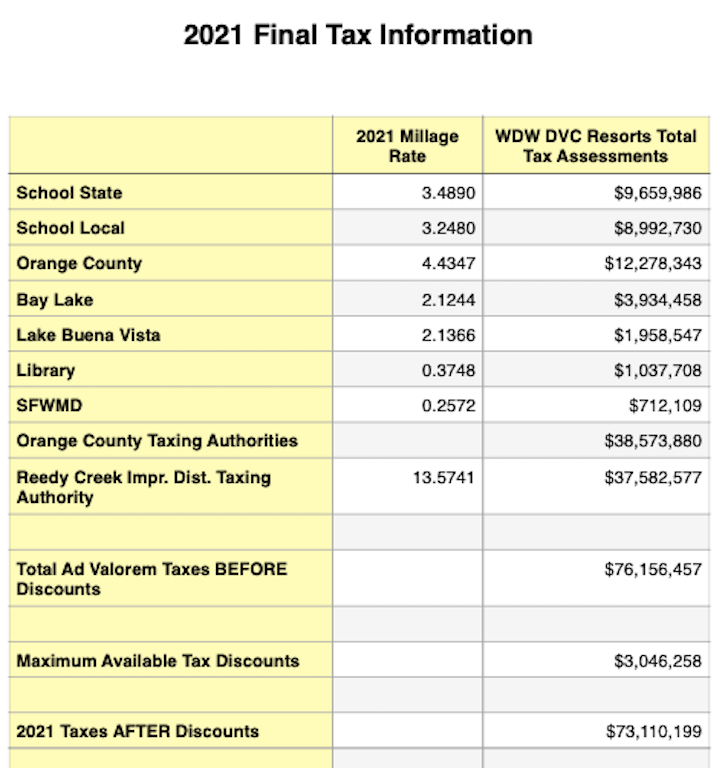Florida Governor Ron DeSantis has signed legislation to dissolve the Disney-run municipality known as Reedy Creek Improvement District. What does this mean for Disney Vacation Club owners?
(Note: The following information has been gathered from a variety of sources and is believed to accurately represent the status of Reedy Creek Improvement District as of April 22, 2022. Thus far, no single source has been able to fully outline the impact of dissolving RCID including Florida lawmakers themselves. This should be viewed as a developing story, with details subject to change.)
When Reedy Creek Improvement District (RCID) was created in the 1960s, it provided two primary benefits to The Walt Disney Company.
First, it paved the way for infrastructure needed to service Walt Disney World. When Walt Disney purchased 43 square miles in central Florida, it was almost entirely undeveloped swamp land. Before building a single theme park or resort hotel, the property required millions of dollars worth of improvements.
In his 2007 memoir “Spinning Disney’s World”, former Disney press agent Charlie Ridgeway describes RCID:
"RCID was created by the Florida legislature as a taxing district to provide necessary utilities and services to this whole new kind of urban development. The district was supported entirely by taxes on Disney property. RCID also developed utility lines, a central power station, environmental test facilities and a distribution station, a Fire Department, road system, a model building and safety code and all the other necessary infrastructure.”
In 1967, the Orlando metropolitan area had a population of just 272,000 residents, and lacked the resources—or the wherewithal—to fund these massive improvement projects. As a stand-alone entity, Reedy Creek Improvement District was able to issue bonds to fund the projects, largely exempting taxpayers from any financial burden associated with building Walt Disney World.
The second benefit to Disney is control. As the de facto head of Reedy Creek Improvement District, Disney does not have to answer to other Florida planning commissions or budget offices when making improvements on their property. The permitting and approval processes are streamlined, with the same people commissioning new hotels and rides having a rubber stamp to approve those projects. However this also means that nearby residents and lawmakers in Orange and Osceola Counties have little-to-no say in how Disney develops its Florida property.
Walt Disney World pays property taxes to the state and counties at the same rate as other area landowners. Its property values are independently assessed by officials with Orange and Osceola counties, and taxes paid at the full millage rates applicable to all residents. Annually Disney pays tens-of-millions worth of taxes on its Florida property, monies which are earmarked for schools, libraries, South Florida Water Management District and other entities.
However, the unique configuration of Reedy Creek Improvement District allows Disney to layer a second tax on its own property. This tax covers all of the items cited above by Ridgeway which fall under the RCID umbrella: fire services, emergency services, utilities, road maintenance, and so on.
Orange County Tax Collector Scott Rudolph has cited a figure of $163 million per year generated by the RCID tax. A portion of that comes from Disney Vacation Club members via taxes included in their annual dues. In 2021, DVC members collectively sent approximately $37 million to fund RCID. See the chart below for details.

The remaining $126 million in operating funds and debt service for Reedy Creek Improvement District is entirely paid by The Walt Disney Company.
Update to my previous tweet re: Reedy Creek—-I undervalued the amount. The $105 million is just their general revenue. They also have $53 million per year in debt obligations. So Orange County would take on $163 million per year.
— Scott Randolph (@ElectRandolph) April 20, 2022
There's also the matter of a reported $1 billion worth of existing RCID bond debt which would be assumed by the counties. Debt service for these bonds is included Scott Randolph's $163 million annual figure for Orange County.
The law signed today by DeSantis paves the way for these services to be integrated to their respective counties by June 2023. The majority of Walt Disney World falls within Orange County, while Disney’s Wide World of Sports and Disney’s All Star Resorts are within the boundaries of Osceola County. These two counties must now prepare to assume responsibility for all of the city services currently managed by RCID.
However, the counties lack taxing authority to generate the $163 million annually currently used to operate the Improvement District. That $163 million in revenue—which includes $37 million paid by Disney Vacation Club owners—goes away. Counties will still be responsible for providing the necessary services, but must find another way to cover the costs or reduce expenses.
The counties have limited power to assess special taxes aimed at Walt Disney World. Instead, counties would be forced to increase property taxes on all residents and businesses in order to cover the shortfall. Some sources suggest a 25% increase across-the-board tax increase for all Orange County property owners would be necessary to cover the shortfall. Disney—and DVC owners—would pay some of that 25% increase, but it would amount to far less than the $163 million both parties are currently contributing to RCID.
8/ They can’t raise sales taxes or impact fees. So, the counties will have to raise property taxes. They must tax every property equally – not just Disney – and therefore it’s expected that property taxes in Orange County will rise as much as 25% next June.
— Nick Papantonis WFTV (@NPapantonisWFTV) April 21, 2022
More modest tax increases may instead be imposed on residents, accompanied with a budget reduction. With Orange and Osceola counties taking control of road maintenance, emergency services and utilities, they could elect to slash budgets specific to the Walt Disney World resort area.
For Disney, the greatest blow would be the loss of control. Right now when Disney chooses to build a new hotel, attraction or restaurant, they do it. Former Disney Imagineer Frank Mezzatesta has stated that construction of Disney’s Contemporary Resort would not have been possible without RCID.
The Reedy Creek Improvement District, known as RCID within the company has its own Building and Electrical Codes that allows for new experimental products to be used. The Contemporary Hotel could not have been built without RCID.
— Frank Mezzatesta (@FrankMezzatesta) April 21, 2022
Richard E. Foglesong’s 2001 book "Married to the Mouse" cites Disney’s ability to rapidly adjust building codes, approving the use of epoxy instead of mortar “after they discovered that epoxy held better and was easier to use.”
Without RCID, projects like the expansion of Disney Springs and the reconfiguration of Buena Vista Drive and World Drive would not only have required approval from Orange County officials, but they would have been subject to the county’s budget approval process. RCID provides Disney with the means to approve and fund such improvements expeditiously, avoiding much of the bureaucratic red tape.
The same is true for smaller maintenance issues. A pothole on Epcot Resorts Blvd can be fast tracked for repair by RCID. The district's healthy budget allows for crews to maintain landscaping and remove litter along the roadways. Once integrated within Orange and Osceola Counties, roadways around the Disney parks and resorts would be entitled to no greater attention than other areas in their respective counties.
However, Foglesong correctly points out that such power can have a negative effect on the surrounding community:
“On one hand, it has enabled the Disney Co. to build a giant pleasure palace that is the most popular tourist mecca in the world, not to mention the largest contributor of sales-tax revenue in Florida. Without their freedom from government regulation, without their ability to self provide government services tailored to their precise needs, that success might not have occurred. On the other hand, the Disney Co….has used its powers and immunities to acquire a competitive advantage over other entertainment and hotel companies, building nightclubs and hotels on a scale never contemplated in their original government charter. Their immunities have impeded local government’s ability to manage growth, even as Disney competes with surrounding governments for convention business, tourist spending, retail and professional office space, and entertainment venues."
Specific to Disney Vacation Club, members would appear to be headed for a reduction in property tax liability should Reedy Creek Improvement District be dissolved in June 2023. Taxes on the Walt Disney World-based properties came in at a millage rate of 27.5 in 2021, of which just under half—13.57 mills—was earmarked for Reedy Creek Improvement District. See Wil Lovato’s prior story for DVCNews with details on the tax breakdown.
Using one resort to illustrate, the 2021 tax assessment to owners of Bay Lake Tower at Disney’s Contemporary Resort was $8.514 million or $1.48 per point. Of that, approximately $4.202 million or $.73 per point was used to fund Reedy Creek Improvement District. That obligation appears set to tend in June 2023.
The same percent applies to all other DVC resorts at Walt Disney World, with the RCID assessment representing just under half of their ad valorem taxes.
Without Reedy Creek Improvement District, DVC owners may see a nearly 50% reduction in their property tax liability. That is unlikely to be the end of the story, given that it leaves Orange and Osceola Counties with a $163 million budget shortfall to overcome. A combination of increasing taxes on all residents and slashing services in the Walt Disney World area are the most direct ways of closing the gap. Florida officials may be able to construct some manner of maintaining the RCID tax structure while still limiting Disney’s control over the region. If they have some specific plan in mind, it has not yet been outlined.
A variety of other outcomes also exist, including legal challenges to the state’s actions, repeal of the dissolution measures and perhaps even some compromise between Disney and Florida lawmakers. Yet we should also question whether The Walt Disney Company will even attempt to oppose the dissolution of RCID. Disney's control over property development was critical more than 50 years ago. But after constructing four theme parks, two water parks, a sports complex, vast shopping district and dozens of hotels, Disney may decide it is preferrable to haggle with county planners over future projects, while potentially saving tens-of-millions of dollars per year in RCID-related costs.
Additional details are certain to emerge in the coming weeks.
(Note readers are encouraged to comment on this story but please refrain from politically-charged responses. Thank you.)





